1. AngelPad
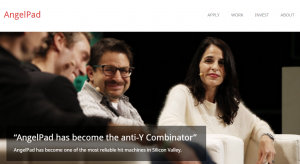 Based out of New York City and San Francisco, AngelPad is a seed-stage accelerator program that’s invested in and launched more than 130 companies since 2010. According to the 2016 Seed Accelerators Ranking Project, it ranks as third best accelerator in the United States.
Based out of New York City and San Francisco, AngelPad is a seed-stage accelerator program that’s invested in and launched more than 130 companies since 2010. According to the 2016 Seed Accelerators Ranking Project, it ranks as third best accelerator in the United States.
AngelPad was founded by husband-and-wife team Thomas Korte and Carine Magescas, and its goal is to “find a bunch of awesome companies with founders we would like to work with and spend three very intense months with them.”
One of the biggest selling points of working with AngelPad is the founders themselves, who prefer a more hands-on approach and offer lots of custom, one-on-one assistance. Magescas has fifteen years’ experience working with startups in high tech, and her breadth of expertise includes technical sales, marketing, information systems project management, and strategic alliances.
Korte, her husband, formerly worked for Google as the company’s first International Product Manager and later became a “super-angel” investor, which is how he came to realize that investing in startups and actually working alongside company founders were very different endeavors. He felt the latter held more value, and as a result, decided to launch AngelPad.
AngelPad keeps each batch of clients that it works with intentionally small—roughly 12-14—even though thousands of companies apply. AngelPad strives to create companies with staying power and well-defined revenue streams.
Co-founder and CEO of Mammoth and AngelPad graduate Karan Gupta says, “AngelPad is a unique program. Zero publicity, it’s founders don’t even run a blog, their entire focus is on the companies…They don’t compete with each other and everyone sits and works together in a large room all day (and many nights).”
The work environment at AngelPad is highly cooperative and community-oriented; the accelerator does its best to make it so that none of the companies in any given session are market competitors. Furthermore, the
AngelPad alumni network is extremely friendly and willing to help guide companies still going through the process by offering investor introductions, partnerships, and fundraising advice.
You need to come prepared to work, though, and keep pushing. According to Korte, “The companies that succeed are the ones that work harder than others. That come in earlier, leave later, that plan ahead, that iterate.”
AngelPad’s portfolio includes the following companies:
- Periscope
- Postmates
- Buffer
- Spotsetter
- LendFriend
- Truly
- DroneDeploy
- Human API
- Piggybackr
- Vungle
Statistics:
130 startups funded
$835,232,971 in total funding raised
Get in touch:
Twitter: @angelpad
2. Capital Factory
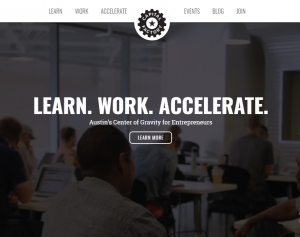
Located in Austin, Texas, Capital Factory “invests in seed stage tech and consumer startups.” According to PitchBook, it’s been rated the number one VC investor in Texas-based startups since 2013.
Founded by Joshua Baer and Bill Boebel, Capital Factory’s mission is “to be Austin’s center of gravity for entrepreneurs.”
As of April 2016, Capital Factory reported 805 members and is considered the place to go for local startups. Members receive weekly mentoring sessions from experienced mentors, investors, and outside experts, focusing on the following: creating clear paths to profitability and attracting funding, press, and talented team members. The training and education that members receive covers a range of topics in order to accommodate startups at varying stages of development.
Plus, a few times a year, Capital Factory hosts what it calls “Epic Office Hours,” which are open to the public and occur in a speed-dating format, bringing together around fifty mentors and one-hundred entrepreneurs. “One of the great things that happens here is office hours, where some of the best entrepreneurs from Austin come and volunteer their time, where anyone who’s working here can come and grab spots to meet with them,” says Joshua Baer.
For serious startups, Baer suggests the minimum amount of necessary capital is $500k. Startups that raise less than that a year won’t have enough for key hires or big investments. To successfully pitch to angel investors and help achieve this goal, Baer recommends the following key ingredients: “having a strong team trumps everything else but having really strong customer traction can also make up for a smaller market or crappy product.”
Capital Factory Co-founder and Executive Director Joshua Baer specializes in bootstrapping startups, digital marketing, and rapid technology development. He is also the founder and CEO of OtherInBox and
UnsubCentral. Capital Factory Co-founder Bill Boebel previously served as CTO for Webmail.us, a company that he grew to $8 million with 72,000 SMB customers. He is also the founder and CEO of Pingboard.
Capital Factory’s portfolio includes the following companies:
- Adjuris Therapy
- AdMass
- Jackrabbit Mobile
- Justworks
- Alpha Turtle, Inc.
- Invoiced
- iTreatR
- PopUp Play
- Rail Yard, Inc.
- SchooX
Statistics:
24 startups funded
$62,032,500 in total funding raised
Get in touch:
Twitter: @CapitalFactory
3. Techstars
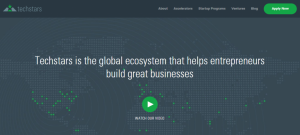 Techstars was founded in 2006 by David Cohen, David Brown, Brad Feld, and Jared Polis. Techstars was created as a solution to the existing angel investing system and as a way to provide startup companies with the additional support they need. With its roots in Boulder, CO, Techstars is a global company that manages accelerators in a variety of other locations, including Boston, Seattle, Tel Aviv, Capetown, and Berlin.
Techstars was founded in 2006 by David Cohen, David Brown, Brad Feld, and Jared Polis. Techstars was created as a solution to the existing angel investing system and as a way to provide startup companies with the additional support they need. With its roots in Boulder, CO, Techstars is a global company that manages accelerators in a variety of other locations, including Boston, Seattle, Tel Aviv, Capetown, and Berlin.
Techstars ranks as the number two startup accelerator in the country (behind Y Combinator), according to research compiled by Professor Yael Hochberg of the MIT Sloan School of Management and Professor Susan
Cohen of the Batten Institute and the University of Richmond.
Techstars’ goal is to “help accelerate the pace of innovation by strengthening the path for entrepreneurs, providing support for entrepreneurial communities, and helping to grow the worldwide entrepreneurial ecosystem.”
The types of startups it funds are typically technology oriented, web-based, or software companies with large-scale reach. Techstars tries to avoid working with competing companies simultaneously. But should competing companies cross paths, every effort is made to prevent any exchange of sensitive data.
When it comes to the application process, the number one thing applicants should focus on is “demonstrating that they are doers,” says Jon Bradford, Managing Director of Techstars London. “We get a lot of applications which describe all the things that they are going to do when they raise money and get into the program. Entrepreneurs should be much more dynamic and proactive.”
David Cohen is the co-CEO of Techstars (along with David Brown) and the founder of several other companies, including iContact.com and Earfeeder. David Brown is a serial entrepreneur who’s helped start three companies and was an early employee of two others. Techstars co-founder Brad Feld has been involved with early-stage investing and entrepreneurship since 1987, having also co-founded the Foundry Group and Intensity Ventures.
And in addition to being an entrepreneur and philanthropist, co-founder Jared Polis serves as a member of the U.S. House of Representatives from Colorado.
Techstar’s portfolio includes the following companies:
- Sphero
- Next Big Sound
- Simply Measured
- Realty Mogul
- Placester
- DataRobot
- Synack
- Outreach
- Yesware
- GoSpotCheck
Statistics:
880 startups funded
$3,445,375,089 in total funding raised
Get in touch:
Twitter: @techstars
4. Tech Wildcatters
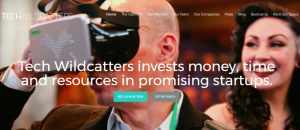
Based out of Dallas, TX, Tech Wildcatters is a “mentorship-driven microseed fund and startup accelerator” that was founded in 2009 by Gabriella Draney Zielke. In 2012, Forbes rated Tech Wildcatters as a Top 10 Accelerator/Incubator based on the value of the accelerator’s startups after completing the 12-week long bootcamp.
Tech Wildcatters is highly selective when it comes to who it accepts into its program. Typically choosing only 8-10 companies per bootcamp, the company uses a more scientific approach to decide which applicants to invite. The top two metrics the accelerator looks at are how badly an applicant “want[s] to win, and win at solving customers’ problems” and what kind of relationship the startup’s number-one and number-two person have with each other, says Draney Zielke.
What makes Tech Wildcatters stand about from other accelerators is the company’s “Gauntlet methodology,” which was rolled out in 2016 and is the first of its kind. “We looked at the behaviors that successful founders exhibited and built out a gamified model to help other entrepreneurs with a business building ‘game plan,” says Draney Zielke. “We now also teach it in a week-long intensive bootcamp format where entrepreneurs can go through their own Gauntlet.”
The Gauntlet consists of a five-stage, leveling-up process, with each stage designed to make sure entrepreneurs can walk before they attempt to run. The leveling-up structure alleviates the pressure entrepreneurs sometimes feel to maintain the same speed and progress as other companies in the bootcamp.
Plus, it allows entrepreneurs to assess incrementally whether or not they want to continue. Entrepreneurs learn what it means to run a successful company and then can decide if that’s a journey they truly want to embark on.
Throughout each stage of the gauntlet, founder and CEO Gabriella Draney Zielke is there helping entrepreneurs connect the dots to create the best companies possible. Draney Zielke is an experienced entrepreneur with expertise in strategy, corporate innovation, and fundraising. Prior to creating Tech Wildcatters, she was a founding member of F6S.
Tech Wildcatter’s portfolio includes the following companies:
- Fetch
- TeleCalm
- Skill Silo
- Pryzm
- FastVisa
- Selery
- Orbii
- MindTalk
- Capparsa
- Chalk Bucket Labs
Statistics:
26 startups funded
$21,900,109 in total funding raised
Get in touch:
Twitter: @techwildcatters
5. 500 Startups
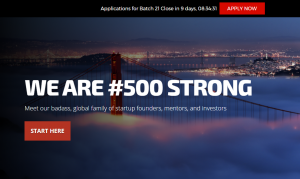 Founded by David McClure and Christine Tsai, 500 Startups is a “global venture capital seed fund with a network of startup programs headquartered in Silicon Valley.” 500 Startups facilitates accelerator programs four times a year, stressing customer acquisition, marketing, and UX and design. 500 Startups also focuses on startups overseas, running a global Distro Dojo project, “which focuses on growth-hacking post-seed companies.
Founded by David McClure and Christine Tsai, 500 Startups is a “global venture capital seed fund with a network of startup programs headquartered in Silicon Valley.” 500 Startups facilitates accelerator programs four times a year, stressing customer acquisition, marketing, and UX and design. 500 Startups also focuses on startups overseas, running a global Distro Dojo project, “which focuses on growth-hacking post-seed companies.
Forbes rates it as one of the top incubators/accelerators in the United States, and a research team from MIT, Rice University, and the University of Richmond gave it a platinum-tier (the highest) ranking in 2016.
500 Startups’ network, which the company refers to as the “500 Family,” includes over 1,000 company founders and more than 200 mentors from diverse backgrounds. The company culture is one of collaboration, transparency, fast-action, and embracing failure. 500 Startups strives to push entrepreneurs outside their comfort zones so their businesses can reach the next level. The company works hard but it plays hard too, embracing a “fun at all costs” motto.
Elizabeth Yin, 500 Startups Partner : “Over the years, we’ve evolved what we’re looking for in our accelerator companies. Though definitely not a hard and fast rule, a typical company coming into our accelerator these days has these characteristics (BLASTR):
: “Over the years, we’ve evolved what we’re looking for in our accelerator companies. Though definitely not a hard and fast rule, a typical company coming into our accelerator these days has these characteristics (BLASTR):
- Balanced, smart team that can learn quickly and be persistent
- Launched product (though we’ve made exceptions for highly regulated industries)
- Aspirations to use our growth resources to help grow like crazy (2-10x revenues in 4 months) and/or raise a big seed round in the Silicon Valley
- Strong understanding of the customer and unit economics behind the business
- Traction. Early but recognizable traction, though not every company fits this bill – we have certainly accepted very high tech companies in areas such as synthetic biology, IoT/hardware/robotics, fintech, etc that have had earlier traction.
- Raised some money previously – we are often no longer the first check into a company (again not a hard and fast rule).”
Co-founder Dave McClure is an angel investor who previously worked at PayPal, Mint.com, Founders Fund, Facebook fbFund, and Simply Hired. Co-founder Christine Tsai formerly worked for Google and YouTube.
500 Startup’s portfolio includes the following companies:
- Le Tote
- GrabTaxi
- Saucey
- Clutch
- Bitrefill
- BidAway
- Dollar Beard Club
- Red Doorz
- Maestro
- Worq
Statistics:
529 startups funded
$885,080,351 in total funding raised
Get in touch:
Twitter: @500Startups
6. Y Combinator
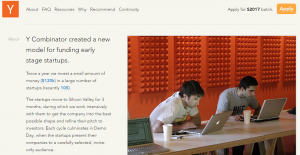
Multiple outlets have rated Y Combinator as the number one incubator/accelerator, including Inc. and Forbes. Y Combinator was founded in 2005 by husband and wife Jessica Livingston and Paul Graham along with Robert Morris and Trevor Blackwell. With the motto “make something people want,” Y Combinator aims to help entrepreneurs improve their product, team, market fit, and business model, and scale their startups into fast-growing companies.
Y Combinator funds all kinds of startups but it specializes in companies involved with web/mobile applications. It works with the founders of these startups helping them flesh out ideas, make pitches to investors, and close the deals once interest is generated. “We can probably help any startup that hasn’t already raised a series A round from VCs,” the accelerator’s website recommends. “Don’t incorporate, though, if you can avoid it. It’s easier to start with our paperwork than to transfer an existing.” Y Combinator also helps mediate any disputes between founders.
At Y Combinator, “We try to interfere as little as possible in the startups we fund. We don’t take board seats or many of the other powers investors sometimes require. We offer lots of advice, but we can’t force anyone to take it. We realize that independence is one of the reasons people want to start startups in the first place.”
Y Combinator Co-founder Jessica Livingston previously worked as the VP of marketing at Adams Harkness Financial Group. Her husband and fellow co-founder Paul Graham wrote the programming book On Lisp and co-founded Viaweb, which later became Yahoo! Store. Robert Morris also co-founded Viaweb; plus, he is a computer scientist who received the 2010 SIGOPS Mark Weiser Award. Trevor Blackwell is a computer programmer and engineer who is also the CEO of Anybots.
Y Combinator’s portfolio includes the following companies:
- Apozy
- Claire
- Hogaru
- Penny
- Pilot
- RankScience
- Riley
- Simply Habit
- Sudden Coffee
- WaystoCap
Statistics:
1,464 startups funded
$13,560,116,884 in total funding raised
Get in touch:
Twitter: @ycombinator
7. The Alchemist Accelerator
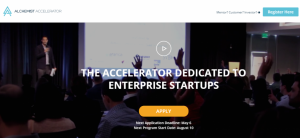
With its headquarters in San Francisco, CA, The Alchemist Accelerator is “exclusively for startups whose revenue comes from enterprises, not consumers.” Venturebeat named The Alchemist Accelerator as one of the enterprise superstars of the year in 2013, the year after the accelerator was launched.
To date, the accelerator has had fifteen acquisitions. It also has companies with more than $1 million ARR. “Some of the most interesting companies in [The Alchemist Accelerator’s] portfolio are working on building quantum computers, antimatter, and printing DNA,” reports Pam Goforth of Funding Sage.
When evaluating applicants, the primary factor The Alchemist Accelerator looks for is the team, the technical and business founders of the companies (a startup ideally has 1-2 technical founders and 1 business-side founder).
The Alchemist Accelerator looks for technical founders who are distinct, exhibiting traits such as technical mastery, resolve, sound judgment, and “a passion for outcomes, not process.” It looks for business founders who can “sell a vision convincingly to customers/VCs/employees and the ability to tactically know the 3 next things that need to get done to drive the business forward.” But founders don’t need an “idea” to apply. As long as you are motivated to make an impact on the world in a big way, The Alchemist Accelerator is open to reviewing your application.
The Alchemist Accelerator was founded by Rav Belani, a venture capitalist who previously worked at Stanford University. Belani started The Alchemist Accelerator after a “3-year entrepreneurship education outreach started in the Harvard Club of San Francisco,” reports Angel.co.
The Alchemist Accelerator’s portfolio includes the following companies:
- Flowcast
- GoodTime
- Geospago
- Keewi
- Puloli
- Byte
- Doxel
- FillMyFork
- Resoltz
- WeLink
Statistics:
166 startups funded
$256,855,313 in total funding raised
Get in touch:
Twitter: @AlchemistAcc
8. Capital Innovators
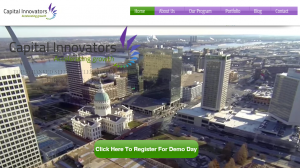
Capital Innovators provides startups with funding, connections, and resources to help them reach the next level. Based out of St. Louis, MI, Capital Innovators was founded by Judy Sindecuse in 2010. Sindecuse is the CEO and managing partner of Capital Innovators. Efficient and organized, she has a proven track record of making startups profitable and yielding the highest possible ROI.
After researching the existing entrepreneurship scene in St. Louis, Sindecuse “concluded that the region’s early stage IT companies required better access to funding and mentorship in order to flourish. St. Louis already possessed a high-quality talent pool, world class universities, and an incredible roster of global corporations.” And so, by combining these resources, Sindecuse created Capital Innovators, St. Louis’ first seed accelerator program.
Since it was founded, Capital Innovators has “consistently been ranked in the top 5% of programs across the country.” The Seed Accelerators Ranking Project also ranked it as a gold-tier accelerator. Fun fact: Capital Innovators is the only accelerator program not based on the coast to have ranked nationally in the top 10. Capital Innovators’ goal is to make St. Louis the tech mecca of the Midwest.
Offering $50,000 in seed funding, Capital Innovators runs two cohorts a year (one in the spring and one in the fall), each lasting 12 weeks, and consisting of just 5-6 companies (out of thousands of applicants). It looks for early-stage technology companies from around the world that are solving real-world problems in meaningful, innovative ways.
Joseph Fincher, Capital Innovators class of 2015, says, “We doubled our funding in the 60 days following completion of the program. The team continues to help us in so many ways–investor introductions, talent acquisition, etc. I even invited one of the mentors to serve on our board of directors.” And for anyone interested in applying, Siddharth Kothari, class of 2016, advises, “Build something that your core users love and [know] where you want it to be in five years. Capital Innovators can then be a great catalyst in helping you get there.”
Capital Innovators’ portfolio includes the following companies:
- Aisle411
- BenefitFeed
- Bluestrata
- Collaborata
- Figures.com
- Gainsight
- Lockerdome
- Pixel Press
- Rovertown
- Semantix
Statistics:
40 startups funded
$166,055,545 in total funding raised
Get in touch:
Twitter: @CapInnovators
9. Boost VC
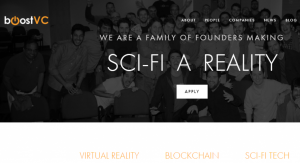 Founded by Brayton Williams and Adam Draper, Boost VC focuses on virtual reality, blockchain and sci-fi technology. Its headquarters are in San Mateo, CA and each year it hosts two accelerator programs, which it refers to as tribes, consisting of around 20 companies. The accelerator invests $10k-$100k in relational, financial, and intellectual capital in exchange for 7% of participating companies.
Founded by Brayton Williams and Adam Draper, Boost VC focuses on virtual reality, blockchain and sci-fi technology. Its headquarters are in San Mateo, CA and each year it hosts two accelerator programs, which it refers to as tribes, consisting of around 20 companies. The accelerator invests $10k-$100k in relational, financial, and intellectual capital in exchange for 7% of participating companies.
When evaluating applicants, the primary criteria Boost VC looks for is the company’s team. “We make investments in people,” states the accelerator’s FAQ page. And considering how Boost VC invests in early stage startups in unexplored markets, the accelerator looks for companies with strong, adaptable teams of founders who are willing and able to move forward together.
Rodrigo Fuentes, Boost VC 2013 tribe alumnus, says, “It’s important to understand what you’re getting out of an accelerator program. For me, it was all about (1) access to an incredible network, (2) rapid customer development, and (3) intros to high-quality investors. Boost VC earned very high marks on all three counts.”
Boost VC Founding Partner Brayton Williams formerly worked in finance at Morgan Stanley and then at a FinTech startup selling private company securities. His main responsibilities at Boost VC are to manage the needs of the accelerator’s 300 plus portfolio alumni and oversee Boost VC’s finances, social media, investment decisions, and general operations.
Founder and Managing Director Adam Draper is a “2x entrepreneur and a 4th generation venture capitalist” who founded Xpert Financial in 2009 and got involved with angel investing in 2012. His investment portfolio is valued at over $1.5 billion.
Boost VC’s portfolio includes the following companies:
- TheWaveVR
- Mindshow
- JanusVR
- Vizor
- Align Commerce
- Stampery
- Fluent
- Favor
- Pillow
- Mirror
Statistics:
138 startups funded
$140,989,129 in total funding raised
Get in touch:
Twitter: @BoostVC
10. Betaspring (RevUp)
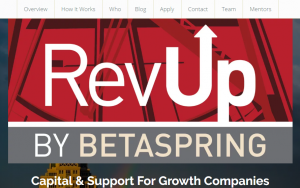
Betaspring is an accelerator program based out of Providence, RI that offers mentorship to B2B and B2C technical and design startups who are eager to change the world. Unlike other accelerators, Betaspring does not take any equity in the companies it invests in. Rather, it sees a return on investment from companies as a percentage of revenue over a 36-month long period. “We win when our companies win,” the Betaspring website says.
Launched in 2009, Betaspring “was among the first ten startup accelerators to launch worldwide.” As a derivative of Betaspring, the accelerator launched RevUp in 2015 as part of the next phase of Betaspring’s mission to build great companies.
RevUp still includes everything that makes Betaspring great, like its mentor-driven model; plus, it has an in-house growth team, facilitating faster action on new business opportunities. RevUp offers founders $75k in investments and the opportunity to participate in a 3-month long immersion program, concentrating on increasing their companies’ revenue and customer acquisition.
Like other accelerators, the primary factory that Betaspring considers when evaluating new applicants is the team behind the startup. “We want people who can figure things out as they go, can absorb new information quickly, and are doggedly committed,” says co-founder Allan Tear. Ideas change, so founders need to be adaptable. He also encourages founders not to wait until they have a perfect product to take action; they need to clearly identify their customers as well.
“Entrepreneurship is an improbable journey…but if you can convince others to join your team and invest in you, then you may be able to sell your vision,” he says.
Betaspring was founded by Allan Tear, Jack Templin, and Owen Johnson. Tear is the founder of three additional venture-funded startups and he is an angel investor in early-stage tech companies. Templin is the also the CEO of Lockify and formerly worked as a lead strategist at iXL (now Microsoft). And Johnson has co-founded nine other companies over the past twenty years.
Betaspring’s portfolio includes the following companies:
- Acustom Apparel
- AstroPrint
- Crunchbutton
- Easy Mortgage Apps
- HealthID
- Manpacks
- Materialist
- Nest4Less
- RF Venue
- SurpriseRide
Statistics:
71 startups funded
$40,727,379 in total funding raised
Get in touch:
Twitter: @betaspring
What do you think of this list? Are there any other top accelerators you think we should know about? Get in touch via social media and let us know!




